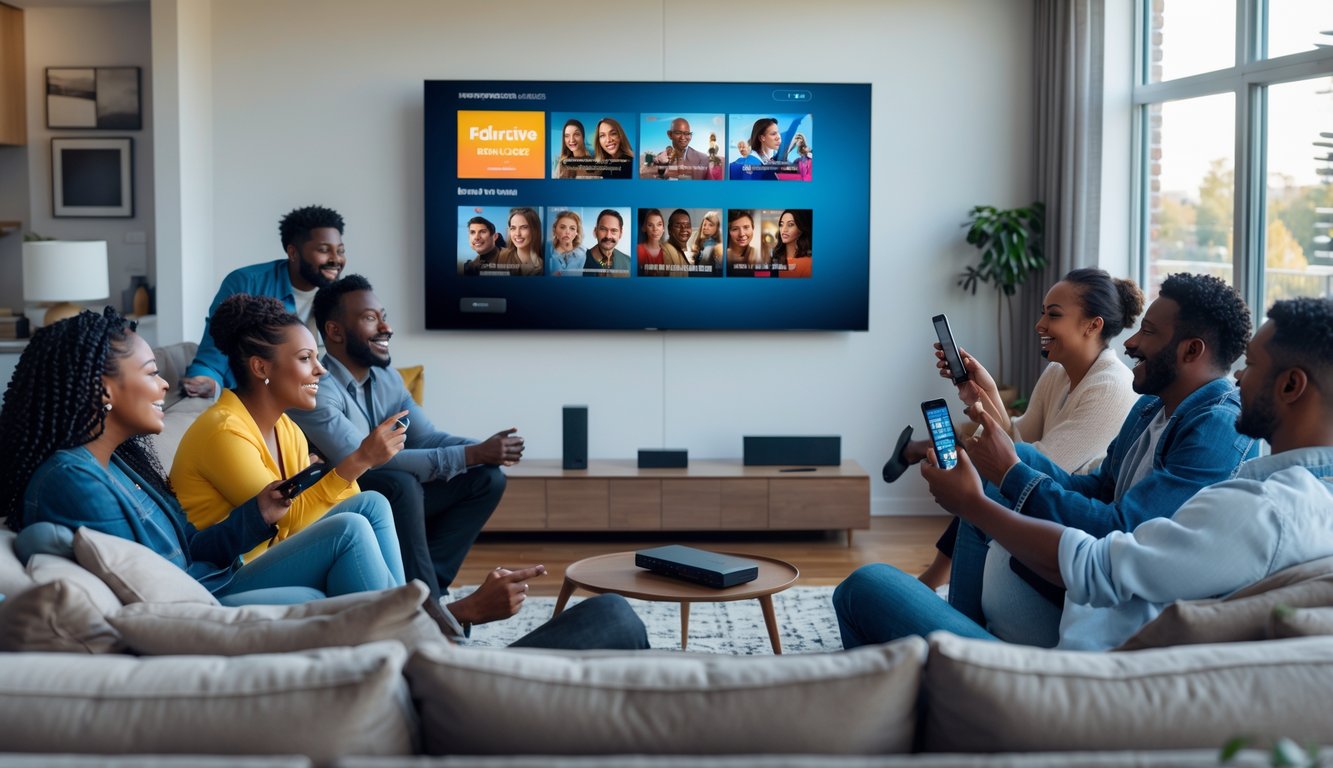
Legal, Financial, and Industry Implications
Ever tried to binge a show, only to find it gone and the app blames “exclusive rights”? Drives me nuts. Underneath, there’s always some copyright drama, pirates making money, and a bunch of lawyers arguing over who owns what.
Copyright Law and Unauthorized Content Distribution
Streaming “exclusivity” is just a wall of legalese—copyright, public performance, scary fine print. I watched an entertainment lawyer on YouTube just sigh and say, “Yeah, we can sue, but it’s like whack-a-mole.” The PLSA turned illegal streaming from a slap on the wrist into jail time, but most people can’t even keep up with which show is missing because two studios are having a slap fight over the rights.
Try explaining the difference between uploading a bootleg and streaming one from a sketchy site. It’s a mess. The law changes depending on which state you’re in, or whether the company’s based in the U.S., or, like, whatever. Unauthorized streams still pop up constantly. The law’s always a step behind.
Financial Losses and Piracy
The numbers seem fake—Disney+ loses millions to piracy every time a Marvel show drops. I don’t get how copyright holders expect to stop torrents after the “exclusive window” closes. If you work in DRM, you know the drill: exclusives boost subscribers, but also teach people to go find “free” versions the second something’s gone. Exclusivity clauses are supposed to keep us loyal, but all they do is make everyone chase content across the internet.
I asked a friend in risk management about watermarking—pirates strip it out in five minutes. Platforms just run around plugging leaks, losing money, and somehow my monthly subscription keeps going up. Content theft? It’s not just illegal, it’s making the whole experience worse for everyone.
Copyright Laws and Intellectual Property
Every lawsuit in entertainment is about IP. “Owning the rights” usually just means someone signed a contract for a short streaming window. So it’s creators, platforms, licensing agents, all fighting for scraps while the rest of us get confused and lose access. Intellectual property is the only thing these companies care about—their contracts decide what we’re allowed to watch, even if the original artist never even agreed to some weird geo-block.
Saw a Reddit post about a show streaming in Canada but not the U.S. because the “IP got sliced up too thin.” That’s value, just leaking out before anyone can enjoy it. Feels like platforms spend more time fighting each other than making sure people can watch what they paid for.
Notable Case Studies in Streaming Rights
Absurd, honestly: one month you’re binging your favorite show, next month you’re on a scavenger hunt through five apps. It’s all contracts, nothing random about it. The industry keeps reinventing itself, sometimes faster than my router can reboot.
The Blockbuster to Streaming Industry Shift
Remember Blockbuster? That weird plastic smell? Gone in a flash. There was that infamous meeting in 2000—Netflix tried to sell, Blockbuster laughed them out of the room. (Thanks, Reed Hastings, for telling that story.)
Streaming explodes, and suddenly the real cost isn’t bandwidth, it’s licensing. Berklee College of Music’s study says licensing dwarfed everything else. Makes sense—why else pay billions for “Friends” reruns? And who’s even watching “Baywatch” in 2024? If I stacked all these contracts, my desk would collapse.
Physical media’s dead. Streaming is the new gatekeeper. If they ever invent “rewind fees,” I’ll probably pay them.
House of Cards and Netflix’s Rise
I still remember when “House of Cards” dropped in 2013. Kevin Spacey’s accent freaked out my dog. Suddenly, nobody cared about network TV. Netflix threw $100 million at a weird political drama, before most people could even spell “streaming.” Studios laughed. Binge-watching shot up 20% (Nielsen said so, but nobody asked me).
Netflix kept exclusive rights. That was the lesson—if you dump money into originals, the audience and the copycats show up. Within two years, original streaming shows went from a couple dozen to hundreds. Now everyone’s hoarding content, terrified Netflix will “pull a House of Cards” again.
People still fight about whether streaming killed water cooler talk or just moved it to Reddit. For what it’s worth, I’m still waiting for Netflix to recommend something I’ll actually finish.
Peacock, Paramount Plus, and Content Migration
I blinked and “The Office” vanished from Netflix. Overnight. Suddenly, it’s on Peacock, and I’m stuck with documentaries about serial killers and a wildlife show I didn’t ask for. Next up, “Suits.” It becomes the top streaming show in the U.S., according to The Current. Apparently, if something’s old enough, it turns into a hit again.
Paramount Plus ripped “Star Trek” away from international Netflix users and forced everyone to subscribe. I know three people who signed up, binged, and canceled in two days. Sometimes, all a streamer needs is one big show to get a quick cash grab. It’s not about the library, just the IP that triggers FOMO.
Trying to track which sitcom is on which service? I had to make a spreadsheet. All I wanted was to watch “Frasier” while eating dinner, but somehow ended up stuck with “NCIS: New Orleans” in potato-quality 720p. Why?
Future Trends in Exclusive Streaming Rights
Nothing stays predictable. Rights bounce around, stuff reappears, blackout periods strike at random. It’s like digital musical chairs, but with more legal threats.
Collaboration and Competition Among Platforms
One day Netflix locks down a sitcom, next day Peacock shares it. It’s not one-on-one—it’s everyone fighting everyone, but pretending to be friends when the cameras are on.
I saw studios and networks try “co-exclusive” deals and “catch-up rights.” Sometimes it helps—you can legally binge old shows without visiting sketchy sites. At a conference, someone said co-licensing “The Office” gave audiences whiplash: fans get confused, platforms hedge, suddenly every service is “essential.”
Everyone’s obsessed with originals, maybe because big-name exclusives are expensive and never really secure. I don’t get why anyone thinks exclusivity is possible when everyone’s sharing custody of the same franchise. One exec told me, “My own team can’t keep track of what we have.” Honestly, same.
Theatrical Release and Video on Demand
Movies hit streaming two weeks after theaters? Feels weird, but I’m not leaving my couch, so whatever. “Second window” pops up in every press release. Studios milk every cent by splitting releases between theaters and digital.
I never get used to second-window sales and digital-first premieres. There’s pressure for instant access, but then stuff vanishes for another exclusive run. I saw a list: over half the top movies streamed within 90 days of release, but tracking where each lands? That’s a part-time job.
Analysts say Gen Z doesn’t care about exclusivity, so platforms juggle partnerships, sometimes splitting a release between three or four places. I still remember a random Wednesday when a blockbuster dropped on some tiny boutique streamer—not the big names. Who plans these things?
Evolving Licensing Issues
Licensing—impossible to keep up with. Netflix pays $100 million for “Friends” for one year, then WarnerMedia grabs it for HBO Max. It’s always the same: bidding wars, takedowns, rights bouncing around like hyperactive rabbits.
Supposedly, rights management and blockchain are going to fix everything. Every time I ask someone in the industry, they just groan. Tech helps, but humans and stubbornness make it a mess. One lawyer said, “Digital licensing is just more paperwork, but with worse fine print.”
International and user-generated content? Just makes it worse. A local show blows up globally, but nobody has the metadata sorted, and suddenly it’s region-locked. Try explaining to your parents why their favorite show is gone. You can’t.



